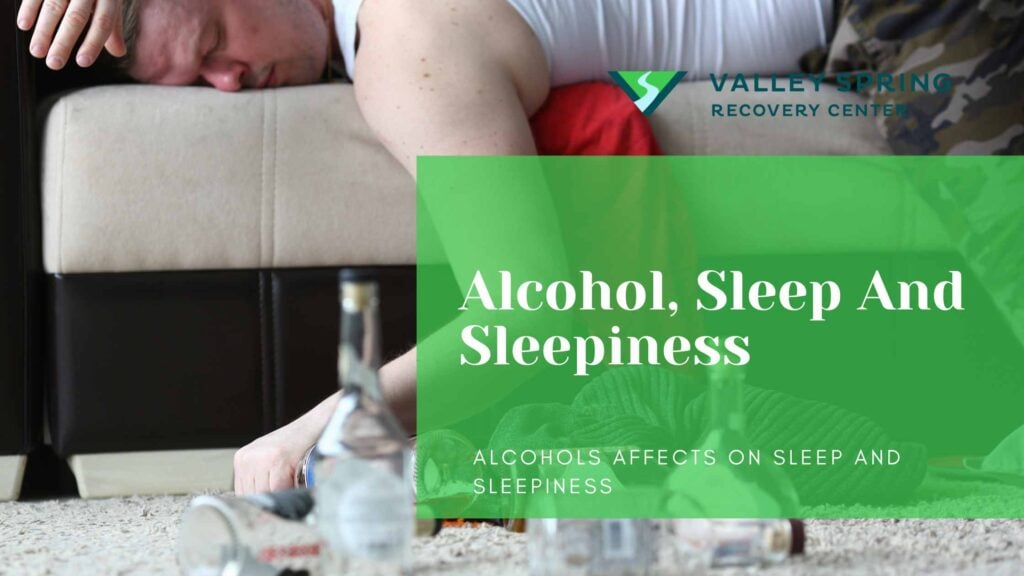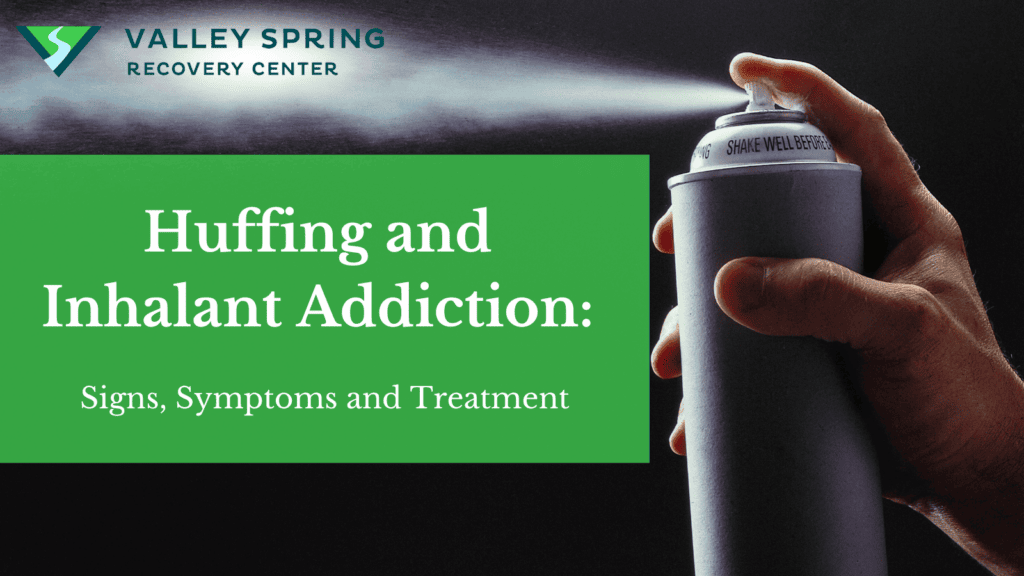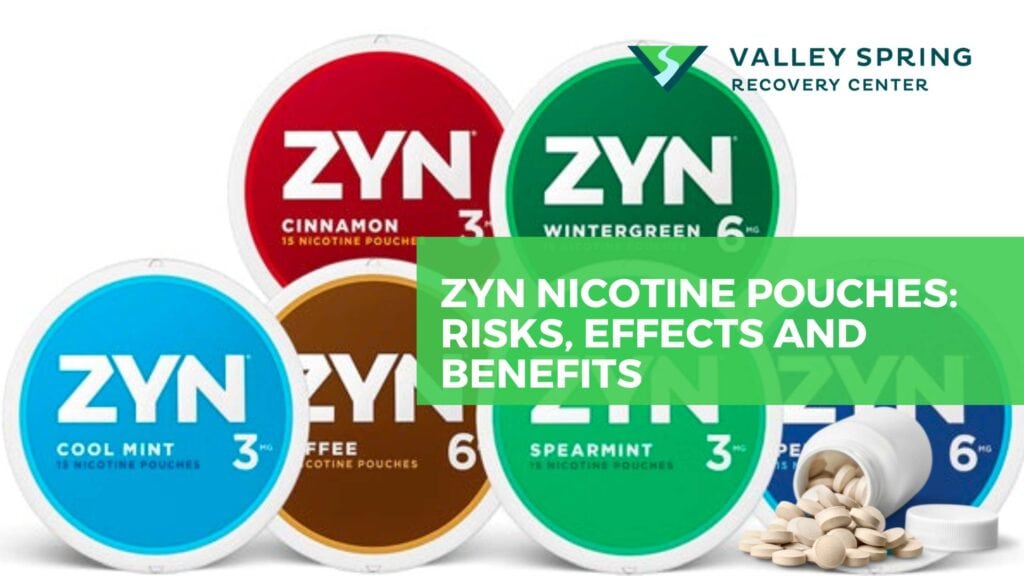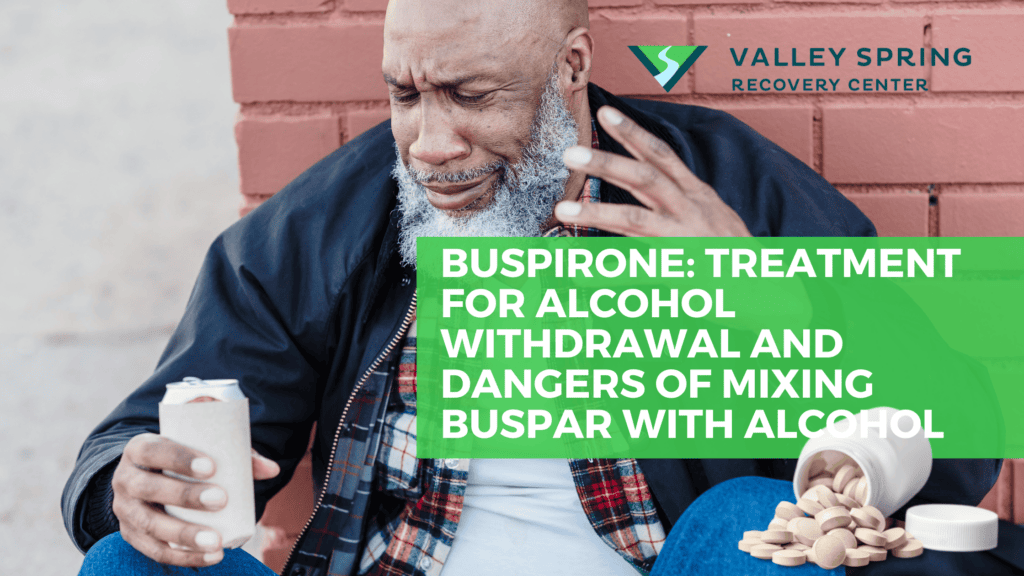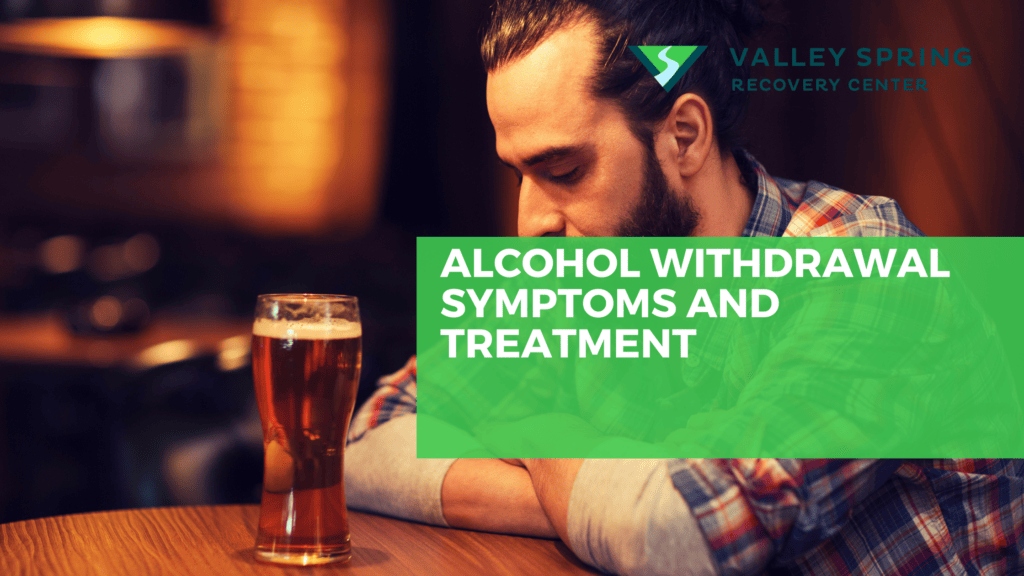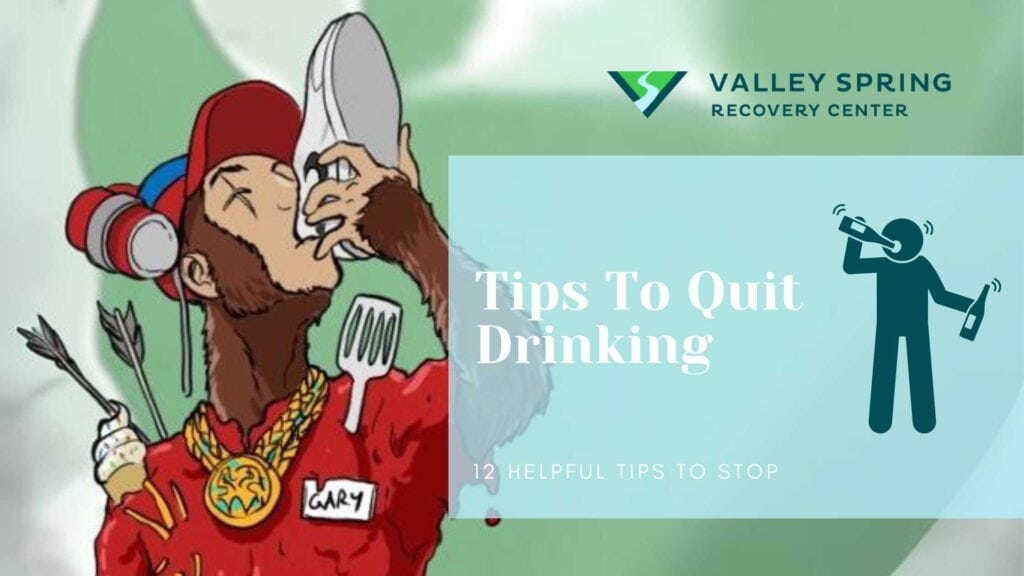Alcohol, a central nervous system depressant, often leads to drowsiness. Alcohol’s depressant effects induce tiredness and lethargy, but also disrupt sleep patterns, making it more challenging to achieve REM sleep.
Alcohol initially reduces the time it takes to fall asleep but as blood alcohol levels reduce throughout the night, sleep quality is negatively impacted. The primary impact of alcohol consumption is a reduction in brain and spinal cord activity. The Centers for Disease Control and Prevention (CDC) noted that sleep-related problems affect a third of Americans which can in part be attributed to alcohol consumption. The biological processes influenced by alcohol, including the enhancement of gamma-aminobutyric acid (GABA) activity and its biphasic effects, significantly affect sleep quality.
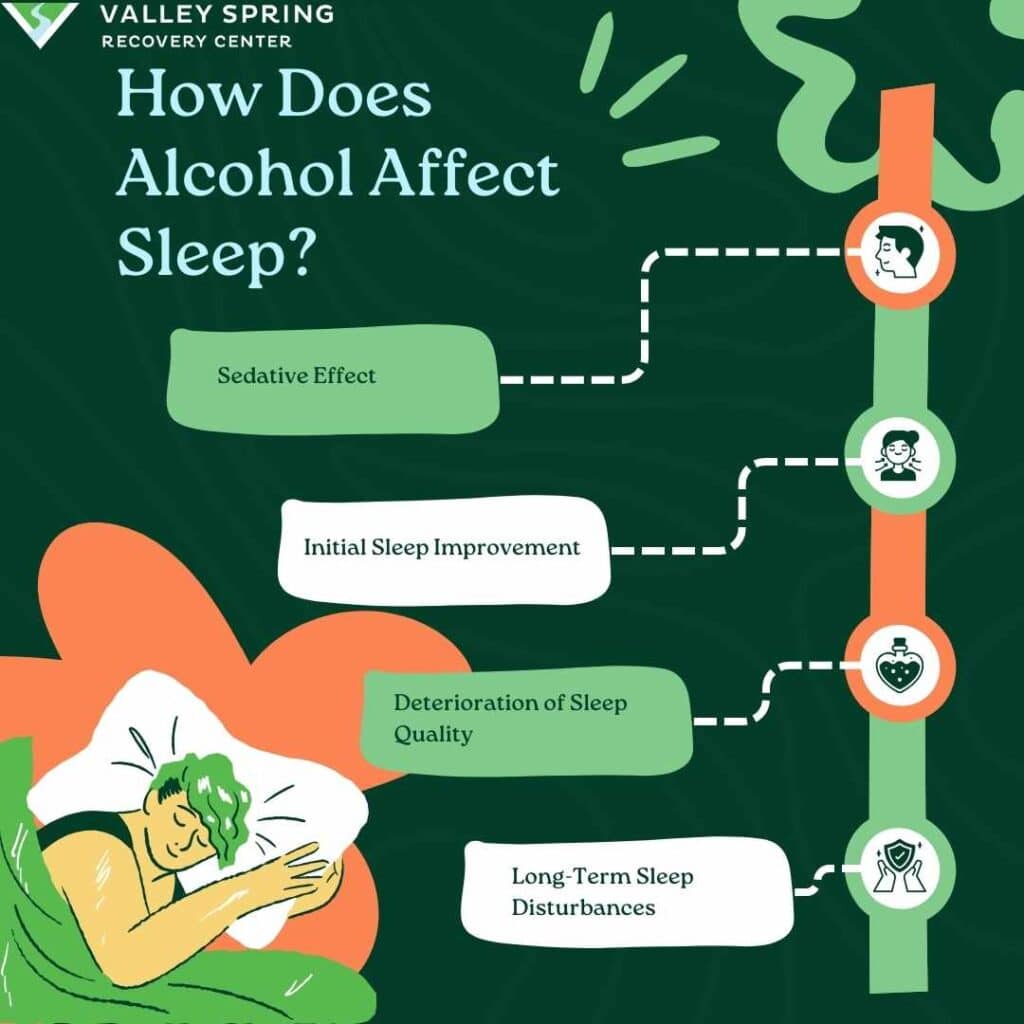
What Affects Does Alcohol Have On Sleep?
Alcohol negatively impacts sleep regulation and quality if large amounts of alcohol are present before sleep. According to Colrain, Ian M., et al’s 2014 study ‘Alcohol and the sleeping brain’, alcohol functions as a sedative, affecting neurotransmitter systems critical for sound sleeping. When consumed in large amounts before sleep, alcohol initially reduces the time it takes to fall asleep (sleep onset latency) and alters sleep architecture. This effect is most pronounced early in the night when blood alcohol levels are high, leading to a temporary improvement in sleep quality.
Alcohol impacts sleep in 4 ways.
First, alcohol is a sedative that depresses and slows down the body’s functioning, causing feelings of tiredness and sleepiness. Once alcohol enters the bloodstream, it circulates to the brain, where it proceeds to slow down the firing of neurons. Relaxation, fatigue, and sleepiness occur when neuron firing decreases when alcohol is present, thus diminishing the time it takes to fall asleep.
Second, alcohol reduces sleep quality and restfulness if BAC levels are elevated when sleep starts. This process occurs as the night progresses and blood alcohol levels decrease, which reduces and deteriorates sleep quality, regulation, and sleep patterns.
Third, Alcohol consumption significantly impacts the body’s natural sleep cycle, particularly affecting the rapid eye movement (REM) stage of sleep. REM sleep is crucial as it represents the deepest and most restorative phase of the sleep cycle. When alcohol is consumed, it disrupts the circadian rhythm or ‘body clock,’ leading to a reduction in the duration and quality of REM sleep. This disruption can affect the overall restorative process of sleep, impacting both physical and mental health. Regular alcohol consumption, therefore, can lead to poorer quality sleep and reduced alertness and performance during the day. REM sleep irregularities can also result in vivid dreams.
Finally, chronic alcohol abuse and dependence are linked to long-term sleep disturbances and can cause insomnia, even after abstinence from alcohol. The National Center for Biotechnology Information (NCBI)found that Alcohol Dependence (AD) is associated not only with insomnia but also with multiple sleep-related disorders.
Why Does Alcohol Make You Sleepy?
Alcohol acts as a central nervous system depressant, slowing neuronal activity in the brain. This slowdown, occurring once alcohol reaches the brain through the bloodstream, leads to decreased neuron firing rates, causing relaxation, fatigue, and ultimately sleepiness.
Alcohol’s sedative effects are partly due to its action on GABA-A receptors in the brain. When alcohol interacts with these receptors, it enhances their activity, leading to increased feelings of sleepiness, especially after consuming just a few drinks. This effect is generally observed in people who are not chronic alcoholics.
Can Reducing Alcohol Improve Sleep Quality?
Yes, reducing alcohol intake can significantly improve sleep quality. By decreasing alcohol consumption, especially before bedtime, individuals can experience more regular sleep patterns, longer periods of deep sleep, and improved REM sleep. This improvement often leads to feeling more rested and alert upon waking.
How Does Alcohol Affect Sleep in the Long Term?
Alcohol can have long-lasting effects on sleep patterns, particularly for chronic drinkers. Chronic alcohol use is linked to prolonged disruptions in sleep architecture, including decreased deep sleep and increased light sleep. These changes can lead to persistent sleep problems even after alcohol consumption has ceased, as the body’s natural sleep rhythms and processes have been altered. Studies have shown that these disruptions can last for months, and in some cases, longer, depending on the individual’s health and history of alcohol use.
Is Alcohol-Induced Sleep Restful?
Sleep induced by alcohol is often not restful or restorative. While alcohol can decrease the time it takes to fall asleep, it disrupts the sleep cycle, particularly the proportion and quality of REM and deep sleep. This disruption can result in a person waking up feeling unrefreshed or tired, despite having spent an adequate number of hours asleep.
What Effects Does Alcohol Have on REM Sleep?
Alcohol disrupts sleep homeostasis, significantly impacting REM (Rapid Eye Movement) sleep, an essential phase of the sleep cycle. This disruption is primarily due to alcohol’s action on adenosine, a key mediator of sleep homeostasis, and the inhibition of wake-promoting neurons in the basal forebrain according to a study from Thakkar, Sharma, and Sahota, published in Alcohol (2015). As a result, even moderate alcohol consumption can reduce time spent in REM sleep, leading to a feeling of being less refreshed upon waking.
How long after quitting alcohol does sleep improve?
Improvement in sleep quality after quitting alcohol can vary significantly based on several factors, including the duration and intensity of alcohol use, individual health, and the presence of any co-occurring sleep disorders. Generally, some individuals may notice improvements within a few days to weeks, while for others, it might take longer.
In the initial days following cessation of alcohol consumption, many individuals experience disruptions in their sleep patterns, including difficulties in falling asleep and staying asleep. This is often part of the withdrawal process. However, as the body readjusts to the absence of alcohol, sleep patterns typically begin to normalize.
In the early phase of alcohol withdrawal, individuals often experience disturbed sleep patterns, including insomnia and reduced sleep quality. This initial disruption is typically a response to the body’s readjustment to the absence of alcohol. According to a study by Brower et al. (2001) in the Journal of Addiction Medicine, it’s common to observe sleep disturbances during the first few days of abstinence.
For chronic or heavy drinkers, the road to normalizing sleep patterns can be longer. Research indicates that long-term changes in sleep architecture, such as a decrease in slow-wave sleep and alterations in REM sleep, can persist for months after cessation of alcohol consumption. A study by Gann et al. (2004) in the journal Alcoholism: Clinical and Experimental Research highlights the prolonged impact of chronic alcohol use on sleep architecture, even after prolonged periods of abstinence.
It’s important to note that improvement in sleep quality post-alcohol cessation is not solely dependent on the duration of abstinence. Lifestyle factors, stress management, and addressing co-occurring sleep disorders play significant roles. Adopting healthy sleep habits and seeking professional help when needed are critical for facilitating sleep recovery.
A note from the author:
When I was drinking alcohol heavily, one of the most difficult parts was that I always felt tired. My sleep schedule didn’t come back immediately but after about 45 days I was feeling much more rested and that has continued through the 10 years that I have been sober. Now I wake up everyday at 5am feeling refreshed which would never happen while I was drinking.
Ben Fisher
Why Does Alcohol Consumption Cause Vivid Dreams?
Alcohol consumption, especially in large quantities, significantly influences the pattern and quality of sleep, which can result in vivid dreams. The primary reason behind this phenomenon lies in how alcohol alters REM (Rapid Eye Movement) sleep, the sleep stage closely associated with vivid dreaming.
During a normal sleep cycle, a person experiences alternating phases of NREM (Non-Rapid Eye Movement) and REM sleep. REM sleep, known for intense brain activity and vivid dreams, typically occurs later in the sleep cycle. When alcohol is consumed, especially before bedtime, it initially acts as a sedative, reducing the time to fall asleep and often suppressing REM sleep in the early part of the night. This effect is documented in studies like the one by Roehrs and Roth (2001), indicating an initial suppression of REM sleep following alcohol intake.
However, as the body metabolizes the alcohol during the night, and its sedative effects wear off, there is often a ‘rebound’ effect in the second half of the night. This rebound can lead to an increase in REM sleep intensity and duration. The result is more vivid, intense, and often disruptive dreams. Additionally, this rebound effect can lead to fragmented sleep, which might also contribute to the recall of vivid dreams.
Furthermore, alcohol’s impact on other neurotransmitter systems involved in sleep regulation, like GABA and adenosine, as shown in studies like those by Thakkar, Sharma, and Sahota (2015), can also contribute to altered dream patterns.
In conclusion, alcohol’s disruptive effect on the normal sleep cycle, particularly its impact on REM sleep, is the primary reason for the occurrence of vivid dreams following alcohol consumption. This underscores the complex relationship between alcohol, sleep architecture, and dreaming.
How Does Alcohol Affect Dreams?
Alcohol can lead to more vivid, intense, and often disturbing dreams. This effect is primarily due to alcohol’s disruption of REM sleep, where dreaming primarily occurs. Alcohol initially suppresses REM sleep, and as its effects wear off later in the night, there can be a rebound in REM sleep, leading to more vivid and memorable dreams.
Can Alcohol Consumption Cause Insomnia?
Yes, alcohol consumption can lead to insomnia. Regular alcohol use, especially in the evenings, can disrupt the body’s circadian rhythm and sleep-wake cycle, leading to difficulties in falling and staying asleep. Over time, this can develop into a pattern of insomnia, where the individual finds it increasingly difficult to sleep without alcohol.
Does Alcohol Impact Sleep Differently in Men and Women?
Yes, alcohol can impact sleep differently in men and women. Research suggests that women may experience more significant sleep disturbances from alcohol consumption than men. This difference could be due to variations in body composition and metabolism. Women generally have a higher body fat percentage and lower water content, leading to higher blood alcohol concentrations and potentially more pronounced effects on sleep.
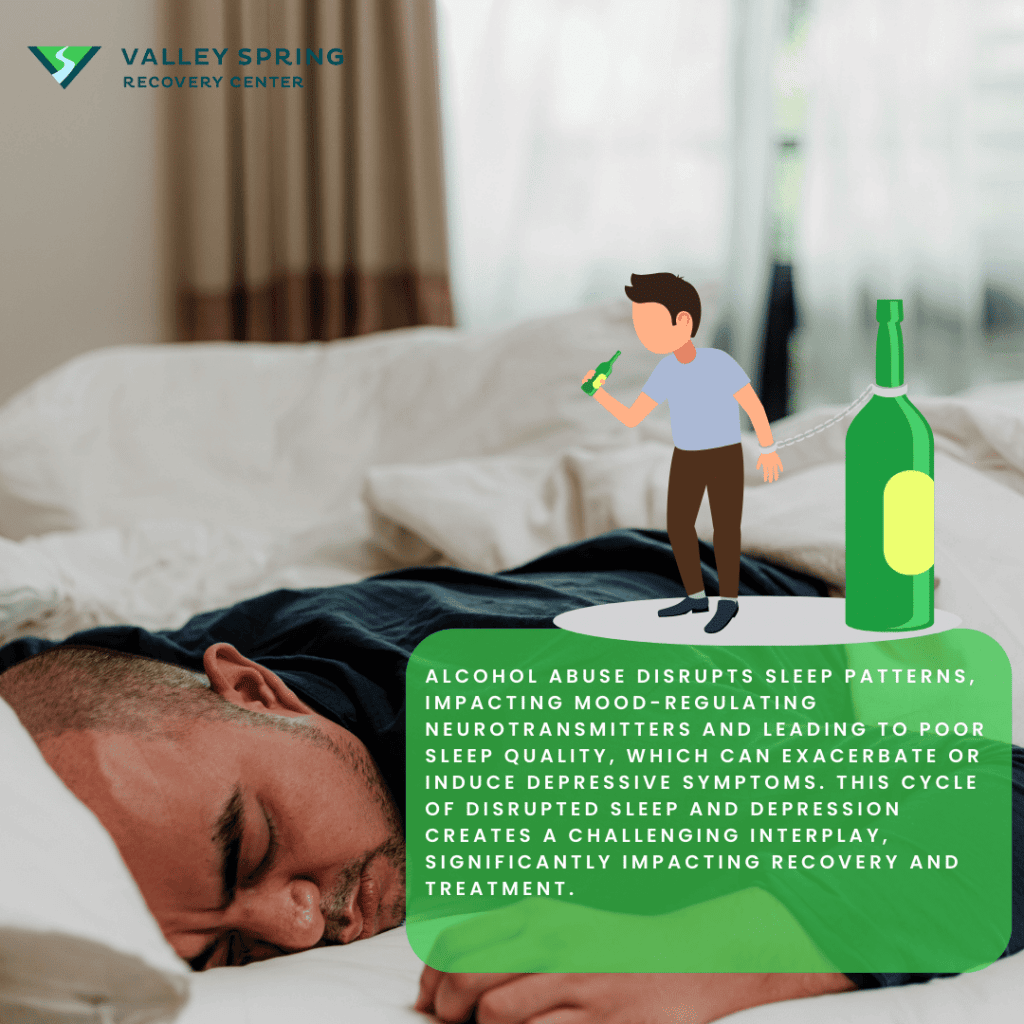
Is Bad Sleep Resulting from Alcohol Abuse Linked to Depression?
Research indicates a significant link between poor sleep quality resulting from alcohol abuse and the development or exacerbation of depression. Alcohol abuse can disrupt normal sleep patterns, leading to poor sleep quality, which in turn may contribute to or worsen depressive symptoms.
Alcohol, as a depressant, impacts various neurotransmitter systems in the brain, including those that regulate mood and sleep, such as serotonin and gamma-aminobutyric acid (GABA). This disruption can exacerbate mood disorders, including depression. Studies, such as one by Brower et al. (2001) in the Journal of Addiction Medicine, have shown that individuals with alcohol use disorders often exhibit symptoms of depression, and this can be partly attributed to alcohol-induced sleep disturbances.
Additionally, chronic disruption of sleep architecture, particularly the reduction in restorative slow-wave sleep and alterations in REM sleep patterns due to alcohol abuse can also contribute to depressive symptoms. According to the research by Gann et al. (2004) in Alcoholism: Clinical and Experimental Research, long-term changes in sleep quality due to alcohol abuse have been associated with an increased risk of depression.
Furthermore, sleep disturbances, including those caused by alcohol abuse, can lead to a vicious cycle where poor sleep contributes to depressive symptoms, and depression, in turn, leads to further sleep disturbances. This interplay can create significant challenges in both the treatment of depression and recovery from alcohol abuse.
In conclusion, there is a well-established link between bad sleep resulting from alcohol abuse and depression. Addressing sleep disturbances is often a crucial component of treatment strategies for individuals suffering from depression and alcohol use disorders.
What Is the Relationship Between Alcohol and Sleep Apnea?
Alcohol consumption can exacerbate sleep apnea, a condition characterized by pauses in breathing or shallow breaths during sleep. Alcohol relaxes the muscles in the throat, which can worsen airway obstruction and the frequency of apnea events. This effect can be particularly detrimental in individuals already suffering from sleep apnea, leading to more severe symptoms and disrupted sleep.
What Role Does GABA Play in Alcohol-Induced Sleepiness?
GABA (gamma-aminobutyric acid), a neurotransmitter in the brain, plays a significant role in alcohol-induced sleepiness. Alcohol enhances the activity of GABA, which has an inhibitory effect on the brain, leading to decreased neuron activity, relaxation, and drowsiness. This GABAergic effect is a key factor in the sedative properties of alcohol.
Ben Fisher
All author postsShare This Post

